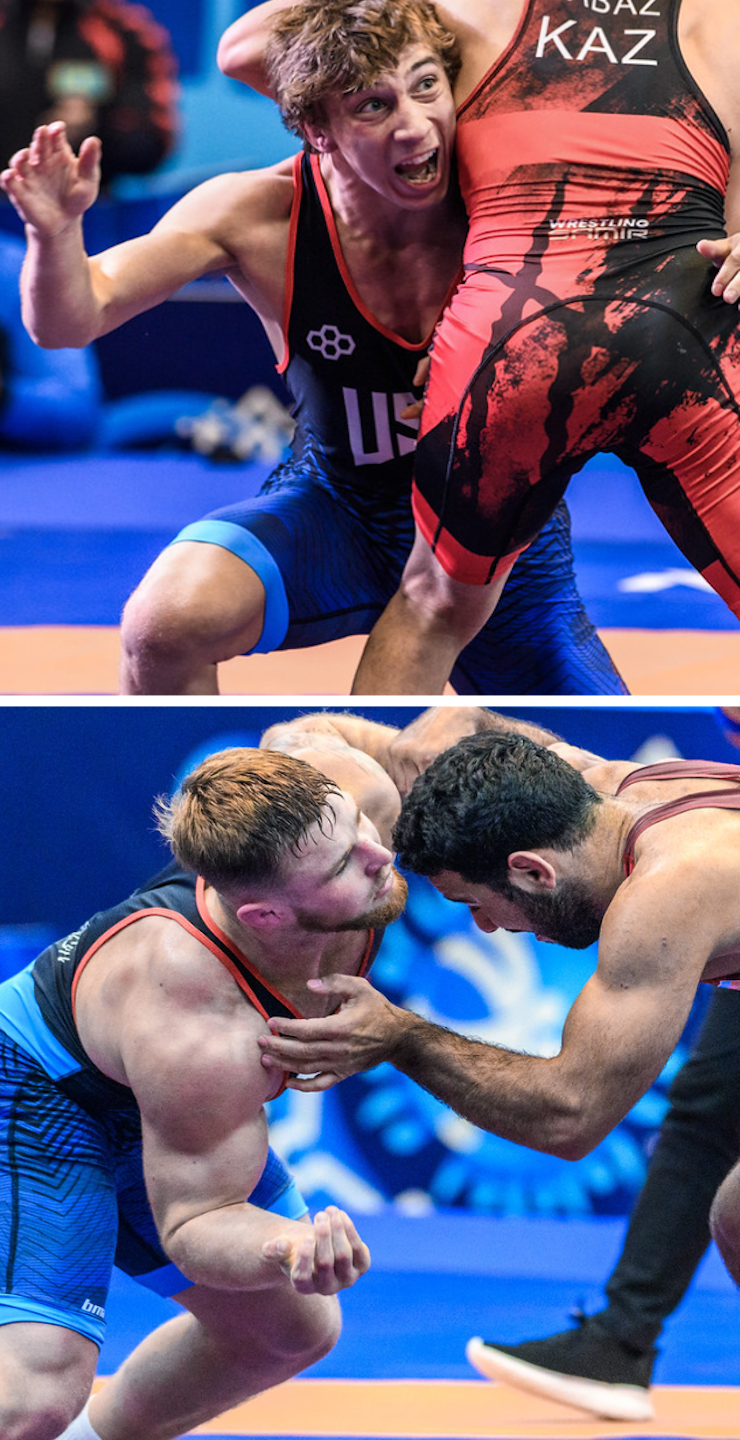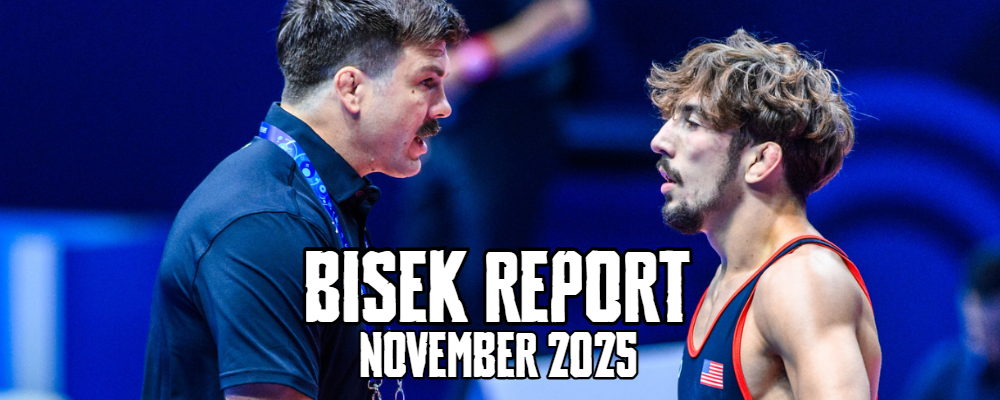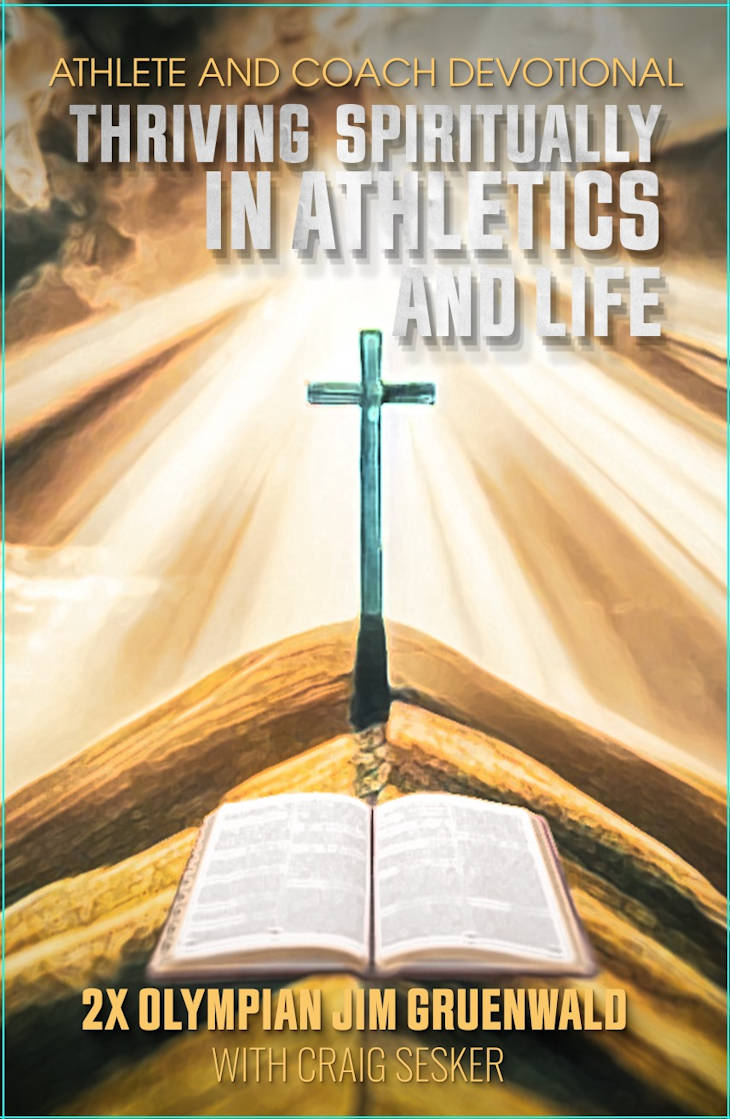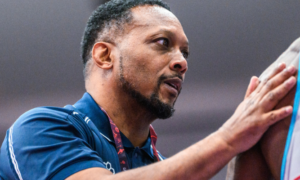Northern Michigan University’s National Training Site for Greco-Roman wrestling had begun rebuilding momentum over the past few seasons and it seems as though the country’s most important program is on the cusp of reaching heights unseen since its head coach was himself a student-athlete.
Under the leadership of head coach Andy Bisek and assistant Parker Betts, NMU has recently produced:
- Their first Olympian in four quads with Payton Jacobson (87 kg) in 2024.
- Two Senior World Team members for the first time in 16 years when Max Black (60 kg) and Jacobson made the ’25 roster this past April.
- Two medalists from the same World Championships for the first time in 19 years with Otto Black (67 kg) and Jacobson both earning bronze last month at the U23 Worlds.
- Two Bill Farrell Memorial/NYAC International gold medalists for the first time since ’18 with U23 World rep Kenny Crosby (55 kg) and Amryn Nutter (67 kg) winning their respective brackets last week in Manhattan.
NMU is surging, the byproduct of a team culture that equally prioritizes goal-setting and unit cohesion because one cannot exist without the other. The standard in Marquette is high. Jacobson leads the charge for his teammates by making sure that all involved are on the same page in that regard, and he appropriately recognizes that lofty objectives appear more attainable when there is a shared desire to reach them. This ethos comes from the head coach, whose own career achievements were made reachable due to a tireless work ethic as well as a support system that both challenged and encouraged his progression.
And it is from that perspective this latest edition of Marquette Matters is being presented. Northern Michigan’s string of successes have reinforced the reminder how valuable the program is to the development of elite-caliber athletes for Team USA, and how NMU is currently going about such business to keep that narrative intact is a priority. Bisek notoriously struggles with assuming even a shred of credit for his wrestlers’ positive performance results, even if there is no denying how tremendous his impact on student-athletes continues to be. Because of his inherent disdain for inserting himself into answers, a number of questions in this report were directed entirely towards Bisek so as to increase the presence of his own personal insights and philosophies — and therefore hopefully shed more light onto how and why NMU is able to develop top competitors for the US program.
Marquette Matters
NMU Head Coach Andy Bisek — November ’25
5PM: Northern Michigan had two athletes make the Senior World Team for the first time in over a decade and had two U23 World medalists, which was the first time in 19 years two wrestlers from the program medaled at the same Worlds. What are a couple of the factors that you attribute to NMU having these types of performances?
Coach Andy Bisek: We had some guys come in together. We had Payton, Max, and Jonny (Jonathan Gurule) come in around the same time and that class was really strong. Those three guys made the U20 World Team together and they had not made a Team until then. They did that together and pushed each other. That group of guys, and newer guys since then, have been super committed to improving always. They try to figure out positions and what they can do from certain spots, and they are hungry, eager, asking questions. We have been able to stay consistent in some things with our training and that shows in the success.
5PM: What are the differences between an NMU freshman from say, 2005, to a freshman at NMU in 2025?
AB: Some of these guys this year, especially guys who have spent time with Lucas Steldt at Combat, they are technically-advanced. There are still some things that we can do with them, but they are ahead of where the incoming classes were when I was a student-athlete in 2005. There are some pretty talented athletes on our team now, and we have had talented athletes in the past. But the ones from the past might not have had some of the small nuances or technical things that some of these guys have.
5PM: What are emotional differences that you have noticed or experienced between coaching at a World Championships and competing at one?
AB: Differences?
5PM: Or similarities.
AB: I think that it is nice in some ways being the athlete because, in some ways, you’re in control. You’re still nervous, and I think there is a good amount of that in both roles. As a coach, I think that things come into your mind. What if this situation happens? What if that situation happens? That is when you have to kind of sit back and understand that if you didn’t address those situations during training, it is going to be hard to communicate those things to the athlete when they are warming up to wrestle at the Worlds. At that point, those things should have already been a focus and have already been worked on.
I don’t know. It’s interesting. I see now not wanting to say too much to them. I just look at their demeanor. I guess as an athlete, I thought that maybe it didn’t matter how much any one coach might want to say to me, but they might try to tell me 50 things at once. Now I don’t think that is as effective.
5PM: At a tournament like this, how do you approach talking to the guys who, on one hand, are winning matches and advancing as well as those who have lost and are eliminated?
AB: For me, when it is the guys who have lost at an event, I try to be respectful of their training. I’m not going to hammer them with a bunch of ‘You should have done this, you should have done that’. It’s harder on them than it is on me, and I take it hard. I feel like we do a good job to prepare. I try to approach them calmly in ways to encourage them and give them the areas where I thought we were good, and then the areas where I felt like maybe the match went wrong. But I like to encourage them that we are going to continue to work on those things individually and as a team to get them where they want to be.
Obviously, the highs are very different from that. I think it is great for the guys who didn’t have the tournament they wanted to be around that kind of atmosphere. For example, Kenny was helping Payton. Maybe not in the same way that he could help someone closer to his weight like Max or Kaden (Ercanbrack), but everyone still helps each other. One person’s success is everyone’s success. They should be around that and enjoying those accomplishments, as well, even if it is not yet their name on the medal.

TOP: Otto Black attempts a body attack against Bagdat Sabaz (KAZ); BOTTOM: Payton Jacobson clashing with Lachin Valiyev (AZE). Both athletes earned bronze medals at the 2025 U23 World Championships last month to give NMU their first medalists from the same World tournament since 2006 when Spenser Mango and Chas Betts made the podium at the University World Championships. (Photos: Tony Rotundo)
5PM: The USOEC (now the NMU National Training Site) had guys who returned home from World tournaments with medals, most prominently Harry (Lester) in ’06 and ’07 at Senior, but even before and after that there were those who performed at age-group Worlds. This I would think creates an effect that reverberates around the room. Do you see similarities between what is going on currently at NMU and when you were a student?
Coach Andy Bisek: Yeah, and you can see it with some guys in the room, too. Really a lot of guys. I feel like guys who maybe didn’t consider having those kinds of goals are now seeing, from being around the other wrestlers, that it is totally possible. If they stay committed to training hard, smart, and remain focused on their goals, it is totally a possibility. When you are training around guys who are performing at that level, yeah, it might sound crazy when you first start out, but pretty soon you are believing that you can do it, too.
5PM: Following the U23 Worlds, just a couple of weeks later NMU had two New York tournament champs for the first time since 2018 with Kenny and Amryn winning. Kenny had that knee thing going on for a while and competed with it at U23’s. Was that an easy decision for him to make, to compete in NYC with that short turnaround from the U23 World Championships? Clearly he won, but was there any discussion about maybe holding him back so that he can recover?
AB: No. I mean, I was always asking how he was feeling but I didn’t question whether or not he should go. I trust that if it were an issue, then I would respect him not going. But with that injury happening when it did, it held him out of preparing for U23’s in a way that he would have liked. He wasn’t really able to prepare for that, but he was also in a good position to put in two weeks of training hard and competing in New York. But for guys like Max, Otto, and Payton, they were training for a long time with preparing for Seniors and then U23’s after that. So, when the U23 Worlds were over, they needed some time away from the mat. Kenny didn’t have that same training going into U23’s so he wanted to be on the mat, and he wanted to get past that match he had at the Worlds.
5PM: Everyone knew that Amryn was good before he got to you. He had already shown everyone that he was really good. From a coaching perspective, what were you most impressed by regarding his tournament win in New York — aside from the fact he won all his matches?
AB: I mean, it was a Senior event and he was in there as the youngest guy. I thought he handled himself well. He didn’t allow anyone to take himself out of it with their physicality or by trying to push him around. He handled himself great, I thought, with his positioning. His par terre was good there. I know that one of the matches I was watching, he wasn’t able to get his lift but used that to get a turn on the other side a couple of times. He is seeing and adjusting instead of sticking with something that his opponents are defending or is not working.
5PM: Charlie McKune wrestled very tough and had a couple of good matches. Can you talk about his progress?
AB: He wrestled well. There was a lot of stuff that I have seen him put out in the room but he has had a couple of unfortunate things come up before different tournaments that stopped him from being able to compete how he wished or was capable of doing. Or not at all. So, I was really happy that he went out there and showed what he is capable of.
5PM: Dobbs, obviously I wrote about him afterwards, but he jumped off the page to me. It is not that he was stylistically different in this tournament but more that it looked like he was wrestling with a different level of self-assurance and confidence. He looked like he is turning a corner here. What is he bringing with him that is carrying over from the practice room?
AB: One thing is that he went to the Senior Worlds as a partner for Payton and Beka (Melelashvili) for the international training camp in Porec, Croatia. He worked with the US guys individually as well as had opportunities to wrestle with foreign guys early in September. I think that it was very beneficial for him to be in that environment, to be at the Worlds and watching it. Again, I think it was very beneficial for him. He is seeing how close he is with Payton and Beka. Technically he has been very good. I think his thing had been letting that go or being confident on the mat. I think now he is starting to see more of that come out after that experience.
5PM: I spoke with Jim Gruenwald yesterday, and of course he had spent time up at NMU the week before you and your guys left for the U23 Worlds. Jim told me he had said to you that the solution to par terre defense in the US is relatively simple, that the US guys just need to get way better at par terre top — because the better guys are on top, the more it creates opportunities for guys to improve at defending from bottom. Do you see that the same way, and do you have any additional insights?
AB: That is one part of it, for sure. You need to have guys who have more confidence and are more skilled, or are building their skills, to keep advancing the defense. Part of it is also conditioning the body outside of the live go’s or any kind of real go’s (in matches). But I do think that is a big part of it. You don’t know what you need to be good at until you get a good guy on top of you. That is when you realize that if you stop for a lift or turn for a bit of time, or you turn this way when his hand is in this place or that place, it is going to affect you. You don’t know this until you’re in that position.
5PM: How do you go about keeping athletes competitively-primed when there is a lack of competitions in our country?
Coach Andy Bisek: Part of it is trying to create those opportunities. We have six Armenians plus a coach coming here and they will be with us starting next week. We’re trying to amp the guys up for that. One of their guys was a U20 World medalist at 63 kilos and has a really good reverse lift. We have to be preparing for that. We have to try to get them to stay excited about things. Then in the middle of December, towards the end of the semester, we had early on asked Doane to come up for a week. They will be training with us and then we’ll have a dual against them on Friday, December 19th.

SUBSCRIBE TO THE FIVE POINT MOVE PODCAST
iTunes | Stitcher | Spreaker | Google Play Music















